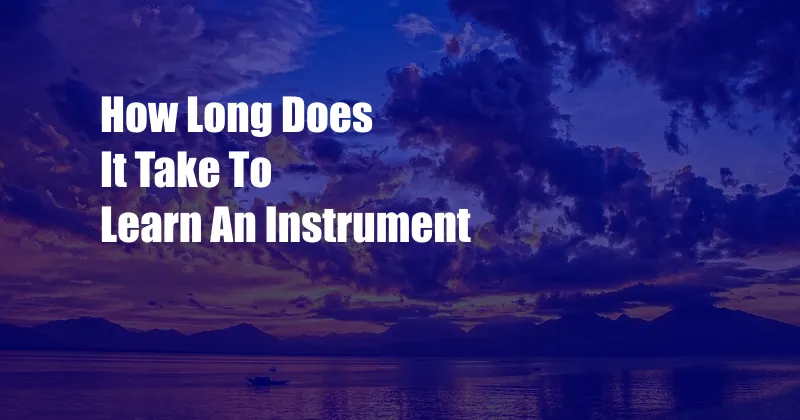
How Long Does It Take to Learn an Instrument?
In the realm of music, mastering an instrument is a journey that captivates the hearts and minds of countless individuals. Whether it’s the enchanting melodies of a piano or the rhythmic pulse of a drum, the allure of creating music with one’s own hands is undeniable.
Embarking on this musical expedition, however, inevitably raises a question that lingers in the minds of aspiring musicians: how long does it take to learn an instrument? The elusive answer to this question depends on a myriad of factors, making it a highly individualized experience.
Factors Influencing the Learning Curve
The path to instrumental proficiency is not a linear journey; rather, it is a tapestry woven with countless threads, each representing a unique factor that shapes the learning curve. These factors encompass:
- Instrument: The complexity and technical demands of different instruments vary significantly. For instance, learning the flute may require less time than mastering the intricacies of the violin.
- Musical Background: Prior musical experience, such as playing another instrument or singing, can accelerate the learning process as it provides a foundation of musical knowledge and skills.
- Practice Time: Consistent and dedicated practice is the cornerstone of instrumental mastery. The more time invested in regular practice sessions, the faster the progress.
- Natural Aptitude: Some individuals possess a natural aptitude for music, grasping concepts and techniques more readily than others. However, perseverance and hard work can overcome any perceived lack of natural talent.
- Learning Style: Every individual has a preferred learning style, whether it be visual, auditory, or kinesthetic. Tailoring the teaching approach to the student’s learning style can enhance the learning experience.
- Teacher: A skilled and experienced teacher can guide and motivate students, providing valuable feedback and support throughout their musical journey.
Unveiling the Learning Timeline
While the exact duration for learning an instrument is unique to each individual, research suggests that with regular practice, noticeable progress can be observed within the following timeframes:
- Beginner Level (1-2 years): During this stage, students focus on developing basic techniques, reading music, and playing simple melodies.
- Intermediate Level (2-4 years): Intermediate players expand their repertoire, delve into more complex techniques, and enhance their musicality.
- Advanced Level (4+ years): Advanced musicians refine their skills, explore advanced techniques, and develop their own unique musical voice.
Expert Advice and Tips for Accelerated Learning
Beyond the fundamental factors that govern the learning curve, there are additional tips and expert advice that can expedite the path to instrumental mastery:
- Set Realistic Goals: Break down the learning process into smaller, achievable goals to maintain motivation.
- Practice Regularly: Consistency is key; establish a dedicated practice routine and stick to it.
- Focus on Technique: Master the fundamentals of proper technique to avoid developing bad habits that may hinder progress in the long run.
- Listen to Music: Immerse yourself in the music of skilled musicians to improve your ear training and musical understanding.
- Seek Feedback: Share your progress with a teacher or fellow musician to receive constructive criticism and guidance.
- Enjoy the Process: Learning an instrument should be an enjoyable experience. If you’re not having fun, it will be more challenging to stay motivated.
Frequently Asked Questions
- Q: Am I too old to learn an instrument?
A: Age is not a barrier to learning music. With dedication and perseverance, anyone can embark on this musical journey.
- Q: How often should I practice?
A: Aim for at least 30 minutes of focused practice each day. Regularity is crucial for consistent progress.
- Q: What instrument is the easiest to learn?
A: The easiest instrument to learn varies based on individual factors. Consider your interests, musical background, and learning style when making a choice.
- Q: Can I learn to play an instrument without a teacher?
A: While it is possible to self-teach, guidance from a qualified teacher can accelerate your progress and provide invaluable support.
- Q: How long will it take me to master an instrument?
A: Mastery is a continuous journey, but with consistent practice and dedication, you can achieve a high level of proficiency within several years.
Conclusion
The path to instrumental mastery is a unique and rewarding one, filled with challenges and triumphs. The duration of this journey varies from person to person, but with dedication, perseverance, and the right approach, anyone can unlock the joy of playing a musical instrument. Embark on this musical adventure today and discover the transformative power of music.
Are you ready to begin your musical odyssey? Let the journey of a thousand melodies commence!